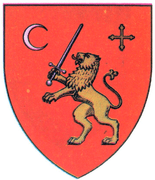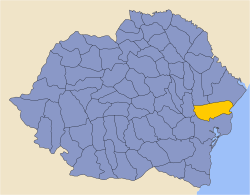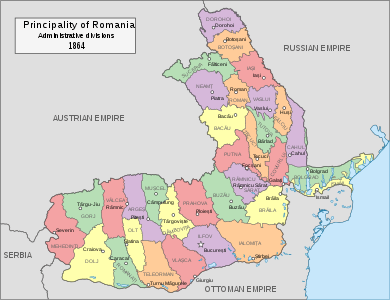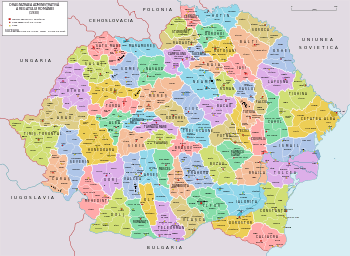Ismail County
Ismail County was a county (județ) of Romania, in Bessarabia, with the capital city at Ismail.
Județul Ismail | |
|---|---|
County (Județ) | |
 Coat of arms | |
 | |
| Country | |
| Historic region | Bessarabia |
| Capital city (Reședință de județ) | Ismail |
| Established | 1925 |
| Ceased to exist | Administrative and Constitutional Reform in 1938 |
| Government | |
| • Type | Prefect |
| Area | |
| • Total | 4,212 km2 (1,626 sq mi) |
| Population (1930) | |
| • Total | 225,509 |
| • Density | 54/km2 (140/sq mi) |
| Time zone | UTC+2 (EET) |
| • Summer (DST) | UTC+3 (EEST) |
Geography
The county was located in the eastern part of Greater Romania, in the south of the historical region of Bessarabia, north of the Chilia branch of the Danube.
The county neighboured the counties of Cetatea-Albă and Cahul to the north, Covurlui to the west, Tulcea to the south and the Black Sea to the south-east.[1] Today, the territory of the former county is primarily in Ukraine, with a smaller part in the west belonging to Moldova.
Administration
The county comprised four districts (plăṣi):[2]
- Plasa Bolgrad, headquartered at Bolgrad
- Plasa Chilia Nouă, headquartered at Chilia Nouă
- Plasa Fântâna Zânelor, headquartered at Fântâna-Zânelor
- Plasa Reni, headquartered at Reni
There were five cities in the county: Ismail (capital), Bolgrad, Chilia Nouă, Reni, and Vâlcov.
Population
According to the Romanian census of 1930 the population of Ismail County was 225,509, of which 31.9% were ethnic Romanians, 29.7% Russians, 19.2% Bulgarians, 6.9% Gagauz, 4.7% Ukrainians, 2.8% Jews, as well as other minorities. From the religious point of view, the county population consisted of 87.9% Eastern Orthodox, 7.6% Old Rite Orthodox (Lipoveni), 2.9% Jewish, as well as other minorities.
Urban population
According to the Romanian census of 1930 the urban population of Ismail County was 75,860, of which 44.7% were ethnic Russians, 24.6% Romanians, 12.4% Bulgarians, 8.1% Jews, 5.0% Ukrainians, 0.7% Greeks, as well as other minorities. From the religious point of view, the urban population consisted of 80.7% Eastern Orthodox, 9.3% Old Rite Orthodox (Lipoveni), 8.2% Jewish, 0.7% Roman Catholic, as well as other minorities.
History
At the end of the Crimean War, by the Treaty of Paris (1856), the South Bessarabia was returned by the Russian Empire to Moldavia. Southern Bessarabia was administratively organized into 2 counties: Cahul and Ismail, and it was part of Moldavia and, after 1859, part of the United Principalities of Moldavia and Wallachia (called Romania after 1866). The Ismail county was split in the 1864 administrative reform, with most of its territory organised into a new Bolgrad county. The rump county remained part of Romania until 1878, when by the Treaty of Berlin (1878) all three counties were ceded back to the Russian Empire in exchange for Northern Dobruja.
After the Union of Bessarabia with Romania in 1918, Ismail County returned to Romania, being formally re-established in 1925.
After the 1938 Administrative and Constitutional Reform, this county merged with the counties of Brăila, Cahul, Covurlui, Fălciu, Putna, Râmnicu Sărat, Tecuci, Tulcea, and Tutova to form Ținutul Dunării.
The area county of the county was occupied by the Soviet Union in 1940 and became part of the Moldavian SSR and the Ukrainian SSR. The area returned to Romanian administration following the Axis Powers' invasion of the Soviet Union in July 1941. A military administration was established and the region's Jewish population was either executed on the spot or deported to Transnistria, where further numbers were killed.[3] As the Soviet Union's offensive pushed the Axis powers back, the area again was under Soviet control. On September 12, 1944, Romania signed the Moscow Armistice with the Allies. The Armistice, as well as the subsequent peace treaty of 1947, confirmed the Soviet-Romanian border as it was on January 1, 1941.[4][5] The areas of the county, along with the rest of the Moldavian SSR and the Ukrainian SSR, became part of the independent countries of Moldova and Ukraine, respectively.
Gallery
 Ismail County as part of the Principality of Romania (1864–1878)
Ismail County as part of the Principality of Romania (1864–1878).jpg) Map of Ismail County as constituted in 1925
Map of Ismail County as constituted in 1925 Map of Ismail County as of 1938
Map of Ismail County as of 1938 Ethnic map of Ismail County per the 1930 census
Ethnic map of Ismail County per the 1930 census
References
- (in Romanian) Memoria.ro, Map of Ismail County, accessed on February 20, 2012
- (in Romanian) Memoria.ro, Administrative Divisions of Ismail County, accessed on February 20, 2012
- James Stuart Olson; Lee Brigance Pappas; Nicholas Charles Pappas (1994). An Ethnohistorical dictionary of the Russian and Soviet empires. Greenwood Publishing Group. p. 484. ISBN 9780313274978.
- "The Avalon Project : The Armistice Agreement with Rumania; September 12, 1944". avalon.law.yale.edu. Retrieved 17 March 2018.
- United States Department of State. Foreign relations of the United States, 1946. Paris Peace Conference: documents Volume IV (1946)
External links
| Wikimedia Commons has media related to Interwar Ismail County. |
- (in Romanian) Ismail County on memoria.ro
